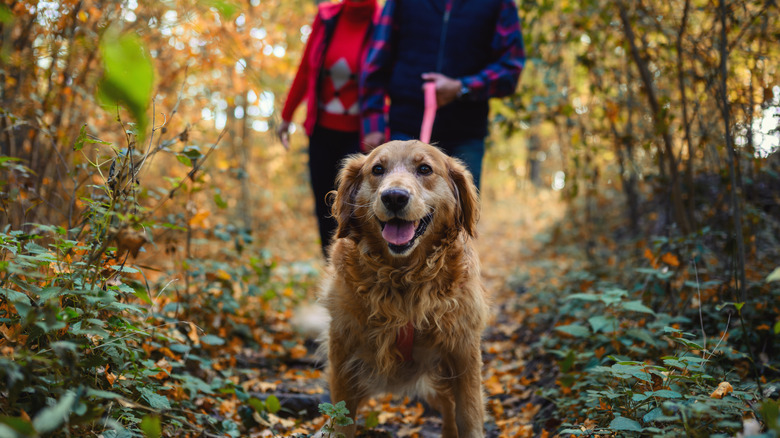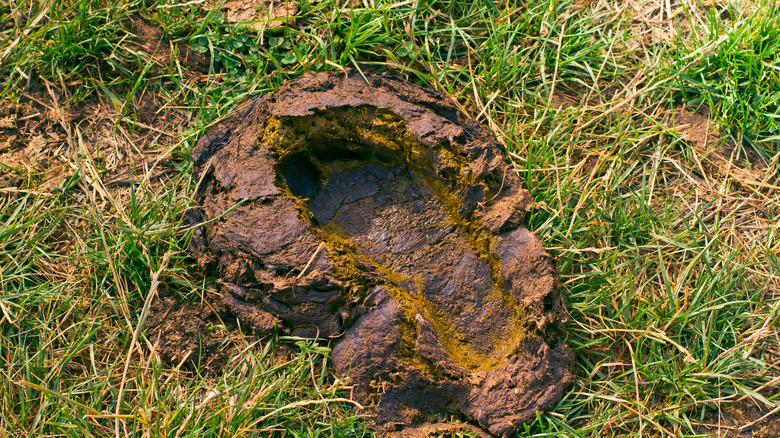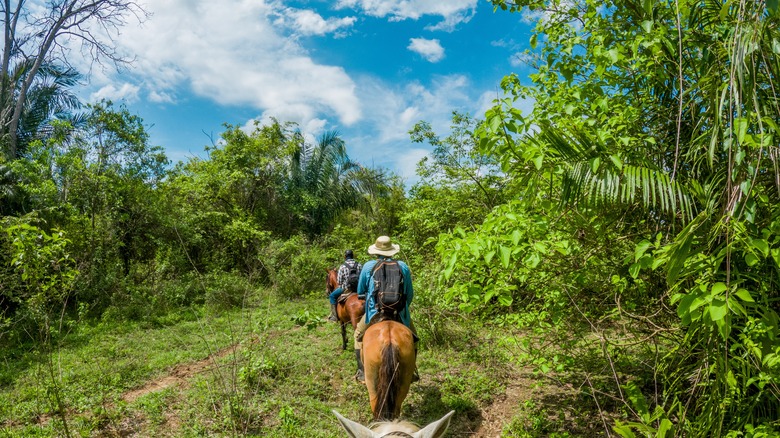Why You Have To Pick Up Your Dog's Poop On The Trail (But Horse Poop Is Everywhere)
If you've ever hiked a popular trail, you've likely encountered a familiar scene: a hiker carefully picking up a plastic bag filled with their dog's poop. These conscientious pet owners are often seen diligently following the rules posted at trailheads, nudging outdoor adventurers to maintain hygiene and protect the environment. Meanwhile, just a few steps ahead, there's a pile of horse manure in the middle of the path, with no one in sight to clean it up. These mounds of horse droppings are often a stark contrast to the well-cleaned areas dog owners have picked up after. The presence of horse manure can make it seem like there's an inconsistency in how different types of waste are handled on the trails. And there is.
It might seem unfair or confusing — why are dog owners expected to pick up after their dogs while horse riders and farm owners seemingly get a free pass? Let's dive into the reasons behind this common trail conundrum.
Environmental impact of dog poop vs. horse poop
One of the most significant reasons dog owners are required to pick up after their pets is the difference in decomposition rates and environmental impact between the two types of fecal matter. Dog poop is not just an eyesore — it is a public health hazard. Dog feces often carry harmful bacteria, parasites and pathogens that can contaminate water sources, spread disease, and harm local wildlife. These microorganisms, including E. coli, Giardia, and roundworms can survive in the soil for long periods, posing a risk to both animals and humans who use the trail. The potential for these pathogens to spread is a major reason why dog waste is regulated in public spaces.
In contrast, horse manure is largely composed of water and digested plant material, since they are herbivores. Horse poop is largely made up of grass and hay, which decomposes more quickly, breaks down naturally, and poses less of a health risk. Moreover, it actually enriches the soil. While it's still unpleasant to step in, horse manure doesn't carry the same level of harmful bacteria or potential for environmental damage as dog waste. As such, there's less pressure for regulations requiring horse riders to clean up after their animals. Having said that, there are some parks and trails that encourage riders to steer their horse off the main path to minimize the impact on other hikers.
Different expectations for trail etiquette
Another key factor is trail etiquette and the expectations for different user groups. Hikers, bikers, and dog walkers typically frequent trails where picking up dog poop is expected as part of maintaining a clean and enjoyable environment for everyone. Dog waste bags are often provided at trailheads, and signs remind dog owners of their responsibility. This is because the practicalities of cleaning up after dogs versus horses also play a role. A dog owner can easily carry a small bag, pick up their pet's waste, and dispose of it properly.
On the other hand, given the size and volume of horse manure, its impractical for riders to dismount and clean up after their horses on the go. That said, responsible trail use is still important for all users. Just as dog owners are expected to pick up after their pets, equestrians and farmers should be mindful of where their animals relieve themselves, steering clear of heavily-trafficked areas. Even so, they often use trails that are designed to accommodate horses and other users. These trails are managed differently, with an understanding that horse manure is part of the experience.


